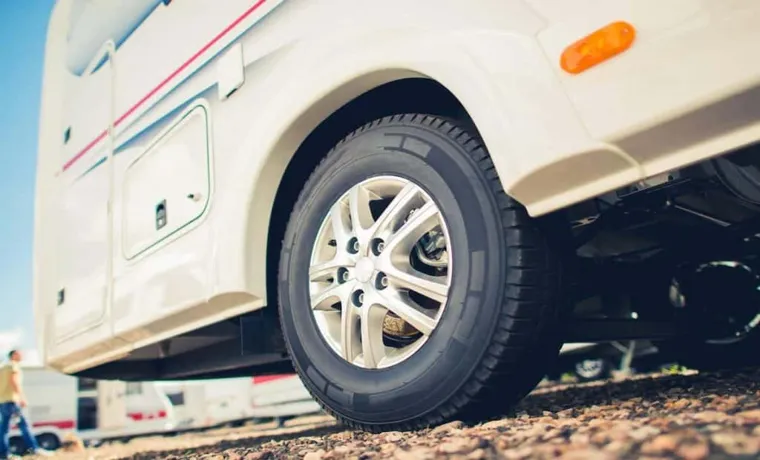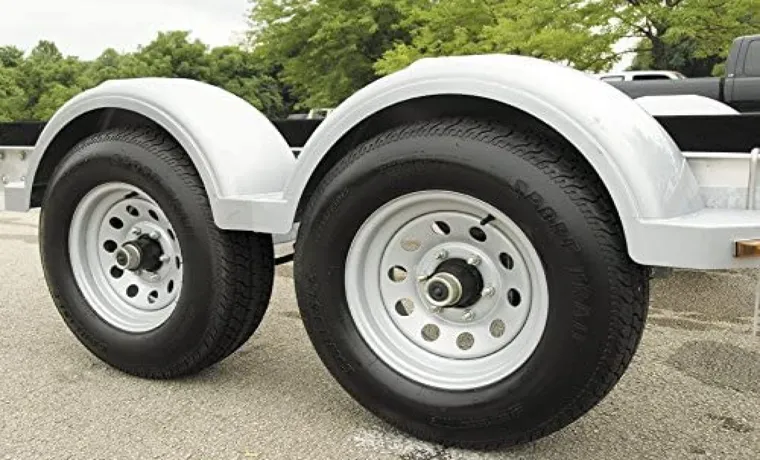If you’re planning a road trip or moving heavy equipment, you know how important it is to have reliable trailer tires. The right tires will offer greater stability, safety, and efficiency on the road, while the wrong ones can lead to unexpected blowouts and delays. With so many options available, how do you choose the right trailer tire for your needs? It’s essential to take into account various factors, including the weight of your load, the terrain you’ll be traveling through, and the type of trailer you’re using.
Each of these factors influences how your tires will perform and what kind of maintenance they’ll require. In this blog post, we’ll explore some of the most crucial factors to consider when selecting trailer tires that are perfect for your needs. We’ll also go over different types of tires, their advantages, disadvantages, and how to ensure proper maintenance so that they last and perform well over time.
So, whether you’re hauling cargo across the country, a boat to the lake, or utility equipment to a job site, we’ll give you the insights you need to make an informed decision and keep your trailer tires functioning optimally.
Table of Contents
Factors to Consider
When it comes to choosing trailer tires, there are several factors to consider to ensure your safety and peace of mind on the road. Firstly, you’ll want to consider the load capacity of the tire, making sure it can handle the weight of your trailer and cargo. Additionally, the tread pattern and depth are important for traction and durability, particularly if you will be driving on rough or wet conditions.
Another crucial factor is the tire’s speed rating, which should match or exceed the maximum speed of your trailer. Finally, you’ll want to consider the tire’s construction, with bias-ply and radial tires being the most common options. Ultimately, a good trailer tire should be reliable, durable, and able to handle the unique demands of towing.
By taking the time to choose the right tire, you can feel confident and secure on your next road trip.
Load Capacity
When it comes to load capacity, there are a few factors that you need to consider to ensure the safety and stability of your equipment. First and foremost, you need to know the weight of the load you’ll be carrying, as this will be the primary determining factor in the load capacity of your equipment. From there, you’ll need to consider the length, width, and height of the load, as well as the type of load you’ll be carrying.
Different types of loads will put different stresses on your equipment, so it’s important to choose equipment that is designed to handle your specific load. Additionally, you’ll want to consider the environment in which you’ll be operating your equipment, as factors like temperature, humidity, and terrain can impact load capacity. By taking these factors into consideration, you can choose equipment with a load capacity that will ensure safe and efficient operation.

Durability
When it comes to purchasing durable items, there are a few important factors to keep in mind. First and foremost, you’ll want to consider the quality of the materials used in the item’s construction. Whether you’re buying a pair of shoes or a piece of furniture, materials like leather, hardwood, or metal are typically more durable than cheaper alternatives.
You’ll also want to pay attention to the item’s design and construction. Is it put together well? Are there any obvious weak points that could break or wear down easily? Additionally, consider the item’s intended use. Will it be exposed to harsh weather conditions or heavy wear and tear? You may need to opt for a more heavy-duty option in these cases.
By considering these factors and investing in high-quality, well-constructed items, you’ll be able to ensure their durability and save money in the long run.
Tread Design
When it comes to choosing tire tread designs, there are a few factors to consider. The first is the type of terrain you’ll be driving on most frequently. For example, if you’ll be driving on mostly pavement, you’ll want a tread that provides good traction and handling on smooth, flat surfaces.
On the other hand, if you’ll be doing a lot of off-roading or driving on unpaved roads, you’ll want a more aggressive tread that can handle rough terrain. Another important factor to consider is the weather conditions you’ll be driving in. If you live in an area with lots of rain or snow, you’ll want a tread that can provide good grip in wet or slippery conditions.
Additionally, you’ll also want to factor in things like noise levels, tread wear, and fuel efficiency. Ultimately, the best tread design for you will depend on your unique driving needs and preferences. So, don’t be afraid to do your research, shop around, and ask for recommendations from other drivers who have similar driving habits as you.
Weather Conditions
When planning any outdoor activity, it’s crucial to consider the weather conditions. The most important factor to take into account is precipitation. Rain, snow, hail, and sleet can all have a significant impact on outdoor activities.
The wind should also be taken into consideration, especially for activities such as sailing, paragliding, or kite-flying. High winds can make these activities unsafe. Temperature is also worth considering.
If it’s too hot, you may need to protect yourself from sunburn and heat exhaustion. On the other hand, if it’s too cold, you’ll need to insulate yourself against hypothermia. Other important weather factors include humidity levels and air pressure.
Different kinds of weather require different preparations. That’s why when you plan any outdoor event or activity, always check the upcoming weather forecast to ensure that you’re well-prepared and safe.
Recommended Trailer Tires
When it comes to trailer tires, finding a reliable and durable option is essential for a smooth and safe journey. A good trailer tire has a strong construction that can handle heavy loads, resist wear and tear, and maintain stability, even when driving on rough terrain. One of the best trailer tire brands available in the market today is Goodyear.
Their Endurance line features advanced technology that ensures better durability, improved fuel efficiency, and enhanced towing capability. Other notable brands include Maxxis, Carlisle, and Michelin, all widely known for their high-quality and performance-oriented tires. Ultimately, picking the right trailer tire depends on various factors, such as the load capacity, the type of terrain, and the size of the trailer.
Therefore, it is best to consult with a professional or a tire specialist to find the most appropriate tire for your trailer.
Goodyear Endurance
If you’re looking for a reliable and durable tire for your trailer, the Goodyear Endurance is a top contender. With its high load capacity and sturdy construction, these tires are designed to withstand the demands of long-distance hauling. They’re made with a special compound that provides extra resistance to heat, which helps to prevent blowouts and other tire failures.
Plus, the Goodyear Endurance features a special belt design that enhances stability and reduces wear, ensuring that you’ll get the most out of your investment. So, whether you’re hauling a boat, an RV, or a utility trailer, these tires are a solid choice that can provide peace of mind on the road. Upgrade to the Goodyear Endurance and experience the difference for yourself.
Carlisle Radial Trail HD
Looking for reliable trailer tires? Look no further than the Carlisle Radial Trail HD. These tires are specifically designed for trailers and provide sturdy and dependable performance on the road. With a durable steel belt construction and optimized tread design, these tires can handle heavy loads and long travel distances.
Plus, the heat-resistant technology means that they’re less likely to experience blowouts or other damage due to overheating. Whether you’re hauling a boat, RV, or other trailer, the Carlisle Radial Trail HD is a great choice for ensuring your safety and peace of mind on the road. So, why not upgrade your trailer tires to something you can trust?
Maxxis M8008 ST Radial
Trailer tires are a crucial component of any trailer, especially when it comes to long-haul travel. One tire model that stands out among others is the Maxxis M8008 ST Radial. The M8008 boasts an advanced tread design that provides excellent traction and stability, even on wet surfaces.
Its sturdy construction and steel belted radial design ensure that the tire stays durable and provides long-lasting performance. Additionally, the M8008 features double steel belts with nylon piles that add strength and durability to the tire’s sidewall. This feature protects the tire from damage and improves its longevity.
So, if you’re looking for dependable trailer tires that offer superior performance and durability, the Maxxis M8008 ST Radial would be an excellent choice for your trailer.
Maintenance Tips
When it comes to maintaining your trailer, one crucial aspect is ensuring that you have good quality tires. But what exactly makes a tire good for trailers? First of all, you want to look for a tire that is specifically designed for trailers, as there are different types of tires for various vehicles. Additionally, you want to make sure that the tire has a high enough weight capacity to handle the weight of your trailer and its contents.
It’s also important to regularly check the tire pressure and tread depth to ensure that the tire is in good condition and can safely handle the heavy load. Ultimately, investing in a good quality trailer tire can save you from potential accidents and costly repairs down the road.
Check Tire Pressure Regularly
Regularly maintaining your tires is an essential aspect of safe and efficient driving. One of the simplest and most effective maintenance tips you can follow is to check your tire pressure regularly. Properly inflated tires are not only safer but also save you money on fuel costs and prolong the life of your tires.
Under-inflation can cause increased rolling resistance, leading to reduced fuel efficiency and increased wear on tires, while over-inflation can cause a bumpy ride and uneven wear. Checking your tire pressure regularly, at least once a month, with an accurate pressure gauge can help you ensure that your tires are always properly inflated. Remember to check the tire pressure when the tires are cold and adjust it according to the vehicle manufacturer’s recommended levels.
Make it a habit to check your tire pressure regularly, and your tires will thank you by delivering a smooth, safe, and economic driving experience.
Inspect for Damage
When it comes to maintaining your home or workplace, one of the most important things to consider is inspecting for damage regularly. This can help prevent small issues from turning into costly repairs down the line. Start by visually inspecting your space for any signs of wear and tear, such as cracks in walls or ceilings, water stains, or even pests.
Don’t forget to check your appliances and systems, such as HVAC, plumbing, and electrical, for signs of damage or malfunction as well. If anything seems out of place or not functioning correctly, contact a professional to assess and repair the problem. By staying on top of inspections and addressing issues promptly, you can save yourself time, money, and stress in the long run.
So, don’t neglect those routine check-ups – they can make all the difference in the health and longevity of your property.
Conclusion
A good trailer tire is like the trusty sidekick to your trailer, supporting you through your journeys and helping to ensure a safe and smooth ride. With durable construction, strong sidewalls, and reliable grip on the road, it’s the unseen hero that keeps your trailer rolling along. So, when it comes to choosing the right trailer tire, don’t settle for anything less than the best – because let’s face it, you and your cargo deserve to have nothing but the finest of companions on your travels.
“
FAQs
What makes a good trailer tire?
A good trailer tire should have a high load capacity, sturdy construction, and good traction. It should be able to handle the weight of the trailer and its cargo, and be resistant to wear and tear.
How do I choose the right size tire for my trailer?
The size of your trailer tire will depend on the weight and size of your trailer. You can find the recommended tire size in the owner’s manual or by consulting a tire specialist.
Can I use regular car tires on my trailer?
It is not recommended to use regular car tires on your trailer as they may not have the load capacity or construction needed to handle the weight and stress of the trailer. It is best to use trailer-specific tires.
What is the difference between bias ply and radial tires for trailers?
Bias ply tires have a reinforced belt that runs diagonally across the tire, making them more durable but also harder to control at high speeds. Radial tires have steel belts arranged in a radial pattern, providing better handling and heat dissipation.
Do I need to replace all my trailer tires at once?
It is recommended to replace all trailer tires at once to ensure even wear and performance. If you replace just one tire, it may affect the handling and stability of the trailer.
How often should I check the tire pressure on my trailer?
It is recommended to check the tire pressure on your trailer before each trip and every month during periods of extended storage. Maintaining proper tire pressure will ensure better handling and longer tire life.
What should I do if I have a flat tire on my trailer?
If you have a flat tire on your trailer, safely pull over to the side of the road and change the tire. Make sure to carry a spare tire and necessary tools at all times. If you are unable to change the tire, call for roadside assistance.



